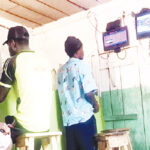
JOHN CHARLES writes on the upcoming Benue senatorial elections and opined that the battles between the incumbent governor, one of his predecessors and other heavy political and religious leaders, promise to be hotly contested
With just eight weeks to February 25, 2023, when the senatorial election will be conducted across the country, the stage is set for the two major political parties that have shown significant presence in Benue State, the Peoples Democratic Party and the All Progressives Congress.
According to reports, the Labour Party may also be going to great lengths to ensure that its influence is felt significantly in the food basket state.
Like other states of the federation, there are three senatorial districts in the state: Benue North East, Benue North West, and Benue South.
Without mincing words, the battle in Benue North East seems to be a two-horse race, i.e., between the PDP and APC candidates, Gabriel Suswam and Emmanuel Udende, respectively, while the Labour Party’s Tonge Malu may be a spoiler for one of the two candidates.
The PDP candidate, Gabriel Suswam, was a two-term governor and a serving senator representing the North East senatorial district. Aside from being an incumbent senator, Suswam, during his eight-year reign as governor of the state, had been able to warm himself into the heart of the senatorial district.
This is even though he lost the 2015 senatorial election to the former national chairman of the PDP, Barnabas Gemade, who contested on the platform of the APC.
If not for the party’s decision that the incumbent governor should be the party leader in their respective states, Suswam, actually holds the ace in the state, and he is currently the Atiku North Central presidential campaign coordinator, the position Governor Samuel Ortom should have held but for the decision of G5 governors to boycott Atiku’s campaign.
Emmanuel Udende, the APC senatorial candidate in Benue North, is probably walking on a tightrope as he is from the same Sankera axis as Suswam.
Udende was a commissioner of local government and chieftaincy affairs under the former governor, George Akume; both were in the PDP then, and in this position, he used to garner grassroots support for himself within the Sankera axis.
He was also a lawmaker who represented the Katsina-Ala/Ukum/Logo federal constituency between 2011 and 2019. Very popular among his people, Udende may also ride on the grass-roots support of his governorship candidate, Rev. Fr. Hyacinth Alia, to turn the tables against Suswam.
Dr Tonge Malu, the Labour Party’s candidate, is undoubtedly trailing these two candidates. He was a consultant in plastic surgery who voluntarily retired from the service of the University Teaching Hospital, Abuja, in 2017 and ventured into politics in 2019. He hails from the same local government (Logo) as Senator Gabriel Suswam.
Since the trio hails from the Sankera axis, they are going to rely on votes from the Kwande and Jechira axes to win the senatorial election.
Other things being equal, the battle is likely to be between PDP and APC candidates.
Benue North West comprises seven local government areas that are split between MINDA (4) and Jemgba (3) intermediaries. The senatorial seat has been zoned to the MINDA axis, where the PDP, APC, and Labour Party candidates hail from.
The national chairman of the Peoples Democratic Party and one-time president of the Senate, Dr Iyorchia Ayu, and the Minister of Special Duties and Intergovernmental Affairs, who is also a former governor, Senator George Akume, hail from the Jemgba axis.
Meanwhile, one candidate to look out for in the senatorial election is Governor Samuel Ortom, who is contesting on the platform of the Peoples Democratic Party.
Everything is in place for him to take the seat. As a sitting governor, he controls the party machinery and has the power of the state to turn things around in his favour.
His gallant display in the face of Fulani attacks is an added advantage in his quest to win the senatorial seat. The Ortom (MINDA) axis has taken the brunt of the Fulani herders’ invasion since 2014.
Though political analysts in the state believe Ortom will have a difficult time given the cold war between him and Ayu on the one hand and the minister’s influence, Senator Akume, on the other.
This, according to analysts, may likely shore up the chances of his opponent in the APC, Titus Zam.
Realising the danger the Ayu factor may portend for his senatorial ambition, the governor had consistently held meetings with political leaders, traditional rulers, and stakeholders in the Jemgba axis, explaining his role in the emergence of Ayu as the party chairman.
Aside from the above factors, the APC senatorial candidate is not a match for Ortom in any contest. Zam was the local government chairman of Gwer West during the Akume administration and was rehabilitated by Governor Samuel Ortom when he served as Special Adviser, Bureau of Local Government and Chieftaincy Affairs between 2015 and 2017.
Incidentally, the movement of Mark Gbillah from the Peoples Democratic Party to the Labour Party to contest the Senate election may have also lowered the chances of the APC candidate.
Both Gbillah and Zam hail from the Gwer West local government area of the state within the MINDA axis; the former is currently a lawmaker representing Gwer East and Gwer West federal constituencies.
The Labour Party candidate is leaning on the momentum going on with the party to win the election. Whether this will work for him remains uncertain.
The battle in Benue South’s senatorial district will be an interesting one considering the calibre of the candidates. Comrade Abba Moro, a former minister of internal affairs, is the PDP senatorial candidate; Daniel Onjeh, a former student leader, is the APC senatorial candidate; and Joseph Ojobo, a former house of assembly member, is the Labour Party, the senatorial candidate.
Abba Moro, no doubt, is the candidate to beat in the forthcoming senatorial election; he is a grass-roots mobiliser.
Previously a lecturer and critic of military rule, he was dubbed a member of NADECO during the Abacha regime, as well as a local government chairman and minister.
A disciple of former Senate President Senator David Mark, he empowered many people within and beyond his senatorial district during his ministerial journey, which has worked in his favour.
He succeeded his political godfather in the Senate in 2019, and his supporters believed that given his impact and accomplishments over the years, he would have little difficulty winning reelection on February 25, 2023.
The APC candidate, Daniel Onjeh, came to the political limelight in 2015 when he challenged the victory of the then-immediate past president of the Senate, Senator David Mark, at the polls.
The Court of Appeal had nullified the election and ordered a rerun within 90 days, but Onjeh eventually lost the rerun election.
Aside from the court victory, little was known about Onjeh, who was an activist, one-time president of the West African Students’ Union and the National Association of Nigerian Students, and currently the chairman of the governing board.
The senatorial candidate of the Labour Party is Joseph Ojobo, a two-time member of the Benue State Assembly who earlier contested the seat with the incumbent, Abba Moro, but lost the ticket.
Ojobo is not a pushover in politics; for instance, in the PDP senatorial election in 2018, he nearly disgraced Moro as he polled 264 votes ahead of the former Minister, who scored 214 votes.
The election, however, was declared inconclusive due to the suspension of voting in three local government areas (Otukpo, Ohimini, and Okpokwu) from taking part in the exercise. It was allegedly the case that the list from the three local governments was tampered with, which led to the disruption of the exercise.
Moro, however, won the ticket at the rescheduled primary and consequently won the election in 2019.
As it stands, the senatorial election in Benue State seems to be open for candidates in the PDP, APC, and Labour Party, but as the English lexicon puts it, it is not over until the fat lady sings.





